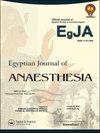Comparison between levosimendan versus beta agonists in preservation of renal function in cardiac surgery patients with low cardiac output syndrome
IF 0.5
Q3 ANESTHESIOLOGY
引用次数: 0
Abstract
Acute kidney injury post cardiac surgery in patients who develop low cardiac output syndrome (LCOS) postoperatively is a serious complication. Many studies have been performed to assess the effect of inotropic agents on cardiac function when administered postoperatively, some studies performed to evaluate the nephroprotective effect of conventional inotropic agents as compared to levosimendan. To evaluate the possible nephroprotective effect of Levosimendan as compared to betaagonists in cardiac surgery patients with LCOS. It is a randomized prospective comparative study at Ain Shams university hospitals from December 2020 to May 2021. A total of 60 patients who have developed low cardiac output syndrome post cardiac surgery divided into two groups of 30 patients each. Group A received beta-agonists (dobutamine 2 - 20 µ/kg/min or adrenaline 0.01 to 0.5 mcg/kg/minute) and Group B received levosimendan for 24 h at a rate of 0.1 mcg/kg/min to a target dose of 12.5 mg. we assessed the incidence of renal failure in these patients. We assessed the progress of acute kidney injury in patients who developed acute renal impairment at diagnosis of LCOS in both treatment groups. Parameters assessed include hemodynamics and renal function parameters. The incidence of acute kidney injury at diagnosis of LCOS postoperative was 30% (n = 9) in each group, 44% of them in the control group (n = 4) developed renal failure at discharge from ICU and none of the study group patients developed renal failure at discharge. At time of discharge from ICU the incidence of renal failure in beta – agonist group was 13.3% while the incidence in the levosimendan group was 0%. Levosimendan has a nephroprotective effect that plays a role in preservation of renal functions and decreasing the incidence of kidney failure in patients with LCOS post cardiac surgery as compared to beta – agonists.左西孟旦与β激动剂对低心排血量综合征心脏手术患者肾功能保护作用的比较
心脏手术后出现低心输出量综合征(LCOS)的患者的急性肾损伤是一种严重的并发症。已经进行了许多研究来评估术后服用增力剂对心脏功能的影响,一些研究是为了评估传统增力剂与左西孟旦相比的肾保护作用。评估左西孟丹与β激动剂在心脏外科LCOS患者中可能的肾保护作用。这是一项2020年12月至2021年5月在艾因沙姆斯大学医院进行的随机前瞻性比较研究。共有60名心脏手术后出现低心输出量综合征的患者,分为两组,每组30名患者。A组接受β激动剂(多巴酚丁胺2-20µ/kg/min或肾上腺素0.01至0.5 mcg/kg/分钟),B组接受左西孟丹24小时 h,速率为0.1 mcg/kg/min至12.5的目标剂量 mg。我们评估了这些患者肾功能衰竭的发生率。我们评估了两个治疗组在诊断LCOS时发生急性肾损伤的患者的急性肾损伤进展。评估的参数包括血流动力学和肾功能参数。术后诊断为LCOS的急性肾损伤发生率为30%(n = 9) 每组44%为对照组(n = 4) ICU出院时出现肾衰竭,研究组患者出院时均未出现肾衰竭。从ICU出院时,β-激动剂组的肾衰竭发生率为13.3%,而左西孟丹组的发生率为0%。与β-激动剂相比,左西孟丹具有肾脏保护作用,在心脏手术后LCOS患者的肾功能保护和降低肾衰竭发生率方面发挥作用。
本文章由计算机程序翻译,如有差异,请以英文原文为准。
求助全文
约1分钟内获得全文
求助全文
来源期刊

Egyptian Journal of Anaesthesia
Medicine-Anesthesiology and Pain Medicine
CiteScore
0.90
自引率
0.00%
发文量
78
 求助内容:
求助内容: 应助结果提醒方式:
应助结果提醒方式:


